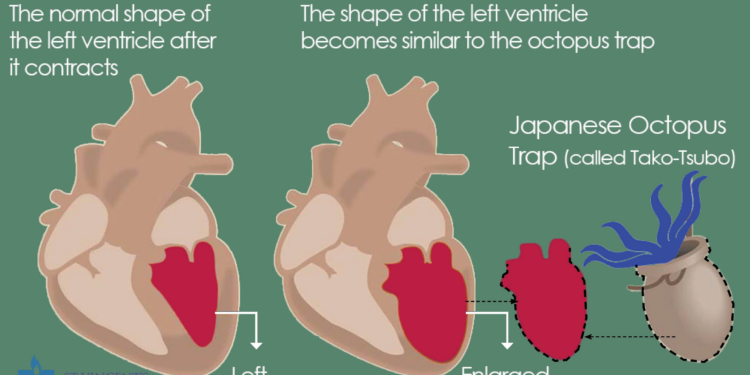Research has unveiled a potential association between COVID-19 vaccines and a condition called Takotsubo cardiomyopathy.
Takotsubo cardiomyopathy is a condition that presents similarly to acute myocardial infarction, with symptoms such as acute chest pain and breathlessness. It is characterized by impaired left ventricular function, typically occurring after intense emotional or physical stressors. The condition is named “Takotsubo” due to the balloon-like bulging of the left ventricle, resembling the octopus-catching pot used in Japan.
Outside of Japan, Takotsubo cardiomyopathy is also known as stress cardiomyopathy, apical ballooning syndrome, or broken heart syndrome. A recent case study published in Cureus described the experience of a 59-year-old woman who developed Takotsubo cardiomyopathy after receiving a booster dose of the COVID-19 vaccine. The patient experienced persistent dyspnea and chest pain, leading to a visit to the emergency department. Further examinations revealed impaired left ventricular function and other complications.
The pathophysiology of COVID-19 vaccine-induced Takotsubo cardiomyopathy is not yet fully understood. However, several theories have been proposed. It is believed that the immune response triggered by COVID-19 vaccines may lead to an exaggerated inflammatory cascade, endothelial dysfunction, microvascular dysfunction, and myocardial injury. Vaccination may also stimulate the release of pro-inflammatory factors. Additionally, the stress response induced by vaccination could potentially dysregulate the autonomic nervous system, contributing to cardiac dysfunction.
The association between COVID-19 vaccines and Takotsubo cardiomyopathy is not widely known, with only a few reported cases. However, a recent peer-reviewed study published in Cureus analyzed the evidence concerning COVID-19 vaccine-induced Takotsubo cardiomyopathy.
The study included 15 case reports involving a total of 16 patients. Among them, 14 individuals received mRNA vaccines (Pfizer, Moderna), while two received viral vector vaccines (AstraZeneca).
Most patients exhibited elevated cardiac troponin levels, abnormal electrocardiogram findings, and reduced left ventricular ejection fraction on echocardiograms. The predominant symptoms were chest pain, dyspnea, and nausea. Most patients recovered and were discharged, but two patients died, highlighting the potentially life-threatening nature of this adverse event.
Clinicians are urged to consider the possibility of Takotsubo cardiomyopathy, especially among recipients of mRNA vaccines, when presented with patients experiencing chest pain or dyspnea symptoms after vaccination. It is essential to monitor and promptly treat any adverse events related to COVID-19 vaccines.
The potential association between COVID-19 vaccines and Takotsubo cardiomyopathy is a concerning finding. Healthcare professionals should remain vigilant and consider this possibility when evaluating patients who experience chest pain or dyspnea after vaccination. The research underscores the importance of continued monitoring and reporting of vaccine-related adverse events.







